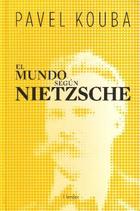In the late nineteenth century, Nietzsche's work represents a turning point in the course of Western philosophy with his critique of metaphysical thought originated in the Platonic-Christian tradition. Based on the new impetus that the German philosopher's spirituality gives her time, the conception of morality, metaphysics or understanding of the value of Christianity, among other things, begin to be addressed in the twentieth century in a new light. Without the work of Nietzsche, the history of the philosophy of this century would have been completely different.
Pavel Kouba's essay explores the imprint that Nietzsche has given to modern thought deeply about the meaning of his work and examining their influence and reception by authors such as Heidegger, Gadamer, Derrida and Habermas.
From a phenomenological perspective, Kouba studies the problem of hermeneutics from Ni...read more








